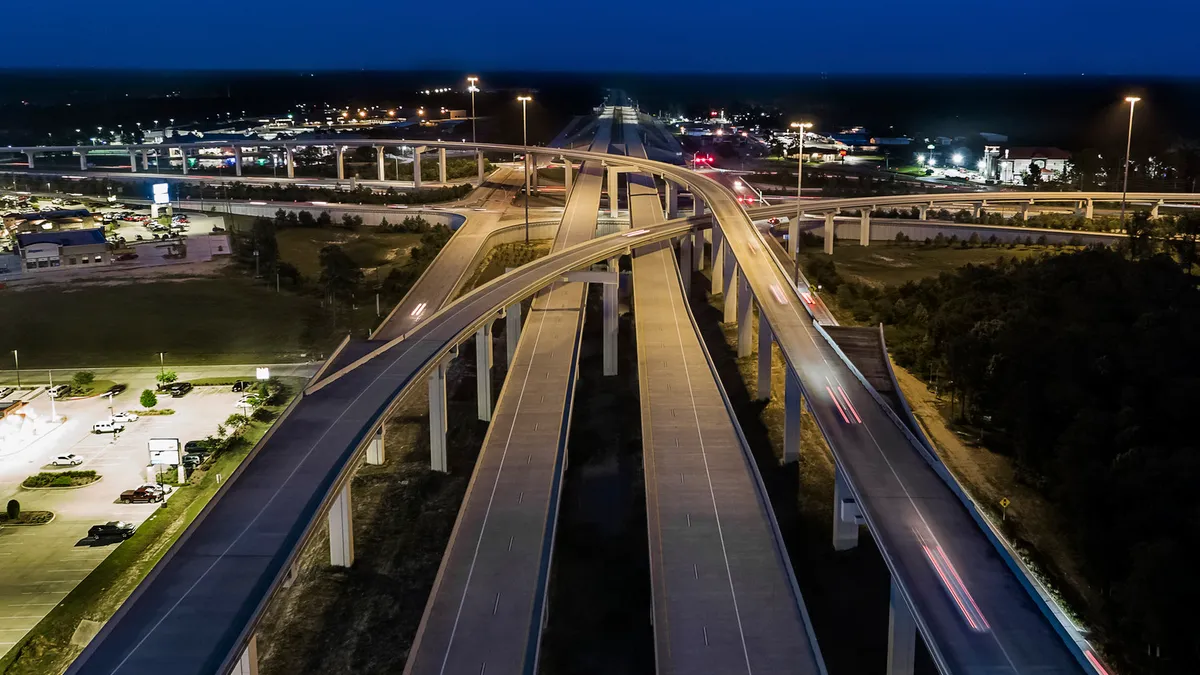Dive Brief:
- Watsonville, California-based general contractor Granite Construction reported net income of $22.1 million for the fourth quarter, compared to a $13.2 million loss 12 months earlier, but also acknowledged an accounting oversight that will force it to restate its previous financial results for the second time since 2021.
- For the full year ended Dec. 31, 2022, the company had $83.3 million in profits, an eight-fold increase from the $10.1 million it reported in 2021. Granite pegged its improved net income to its focus on smaller, higher profit projects and the unleashing of cash from the Infrastructure Investment and Jobs Act.
- Overall revenue was down for the quarter and year at $789.2 million and $3.3 billion, respectively, marking drops of 2% and 5.7%.
Dive Insight:
The firm’s backlog measured $4.5 billion at the end of 2022, a $475 million, 11.8% increase from a year earlier. That amount included $1.7 billion, a company record, from the firm’s California group. In Granite’s home state, the firm said transportation funding had increased 42%, or approximately $1.5 billion, with the same level expected for the next several years, despite a $22.5 billion deficit in Gov. Gavin Newsom’s proposed budget.
The company’s generally positive momentum in its numbers was marred by an announcement that it would need to again restate its financials. The numbers do-over this time will be for Q1 and Q2 of 2022, due to a failure to record a $12 million tax accrual from the sale of its Inliner piping business last year.
Previously, the firm restated three years of its financial results going back to 2017, after accounting irregularities came to light in its heavy civil group. The firm agreed to pay $12 million to settle the matter with the Securities and Exchange Commission, which also charged a former executive with financial reporting fraud.
Pivot to smaller jobs
That scandal actually resulted in Granite pivoting away from $500 million and greater “mega” projects, which can have years-long timelines and hard-to-predict costs, to smaller, simpler projects, a strategy that has been improving its profitability.
As it has worked its way through the remaining large jobs on its books — which it refers to as its “old risk portfolio,” or ORP — its focus on smaller, more profitable projects has helped it regain its financial footing. The company said that its gross profit margins on its smaller projects improved to 13.7% in 2022, up from 12.7% in 2021.
“I don't expect to talk about the ORP anymore, and that is good news for the company,” said Kyle Larkin, Granite’s president and CEO, on a conference call with investment analysts Thursday, while noting the firm has just $85 million of backlog left in its ORP. “At this point… we don’t see it being a huge risk.”
IIJA funds hit projects
As exemplified by the record backlog in its California operating unit, Granite said it is beginning to feel the real impacts of money from the IIJA flow into state and local coffers. Going forward, the company issued guidance of $3.4 billion to $3.6 billion in revenue in 2023.
“I am very encouraged by the tailwinds we are seeing not only in our construction segment, but also throughout the entire civil construction industry,” Larkin said on the call. “While it's taken longer than hoped for, IIJA funds have reached the states, money has been allocated to projects and states are working to get the projects out to bid.”
That viewpoint aligns with reports last week from Granite’s domestic, publicly-traded peers. Both Jacobs and AECOM cited increasing funding momentum at the state and local levels in their own earnings reports.
Larkin also said the firm was beginning to see fewer negative influences from cost increases that have plagued the construction industry in recent years.
“I am encouraged by the bid activity across the company and the declining impact of inflationary pressure on energy costs as we enter the first quarter of 2023,” Larkin said.
Waiting on storm work
Despite an estimated $1 billion in damages from a series of intense winter storms in California, Larkin said the firm had only booked $10 million to $15 million in emergency response work as a result thus far.
That could be due to some of those projects being awarded to small business enterprises through the Army Corps of Engineers, particularly in the hard-hit Santa Barbara area, Larkin said.
But he also noted additional projects would likely materialize from the storms as 2023 progresses.
Those will emerge “as projects get engineered and put out to bid over the year, so we will participate in those,” Larkin said. “It’s hard to predict at this point what our success rate will be and how that really falls into our [backlog], but more to come, I would suppose.”















